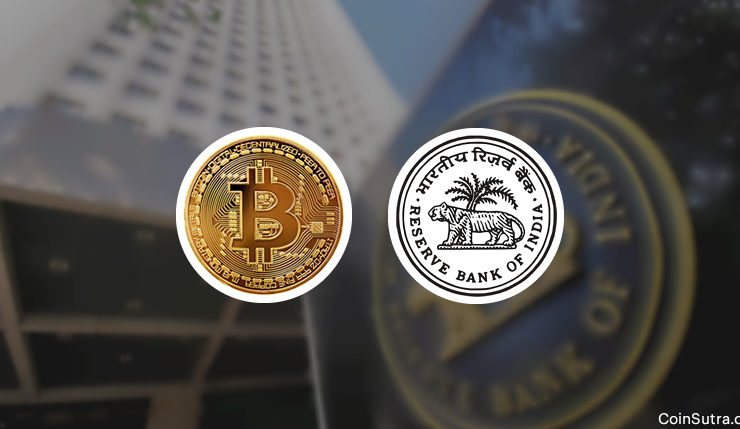Skip to content

View Point
- While the policy will dampen the rate of adoption, it is possible that cryptocurrencies may continue to be attractive, with demand being met at over-the-counter markets instead of exchanges
- The Reserve Bank of India’s (RBI’s) latest circular on cryptocurrencies has landed a decisive blow on the burgeoning market in the country, ending months of speculation about how crypto-assets would be regulated by the government.
- The notification forbids entities regulated by the RBI from dealing with, or providing services for facilitating trade in virtual currencies (VCs).
- The intention is to starve the market of liquidity and put further pressure on people whom the RBI had hitherto failed to persuade, with Indian cryptocurrency exchanges continuing to add users in the midst of rising valuations late last year. The market has since crashed and cooled, and many who invested have been burnt.
Concerns
- But the question that remains is whether RBI’s role should be that of an adviser or a guardian. The latest notification doesn’t explain the trigger for the central bank, but the December 2013 notification lays down the RBI’s concerns with crypto-assets. Some of these concerns are more legitimate than others.
- These are concerns about the security of electronic wallets and private keys, the lack of a centralized authority or underlying asset, the unregulated nature of bitcoin exchanges, and the use of virtual currencies to fund illicit and illegal activities.
- At other times, the RBI and the government have cautioned users about the speculative nature of these assets.
- The anxiety about the lack of a centralized authority or underlying asset betrays a fundamental misunderstanding of the bitcoin project. The blockchain serves as a protocol that ensures trust by virtue of being immutable and irreversible.
- The currency was invented precisely so that users don’t have to trust an intermediary in order to exchange assets of value. Sure, not being able to reverse a transaction comes with trade-offs, but its tamper-proof nature is what creates trust in the system.
- The other concerns about security and the potential to support illegal activities can be addressed by regulating cryptocurrency exchanges.
- Most users don’t want to handle their private keys and store their assets at the exchange. This makes these exchanges a honeypot for hackers. The Mt Gox hack in 2014, and last month’s Coincheck hack, led to losses of almost $1 billion.
- Therefore, all exchanges must be made to follow industry best-practices in ensuring the security of users’ private keys, complying with know-your-customer rules, and reporting any unusual activity.
Regulation :
- However, owing to the nature of crypto-currencies, regulation will have its limits. Since virtual currencies are immutable and peer-to-peer, they cannot be stamped out unless they themselves cease to be valuable.
- Until now, VCs have proved to be too volatile to be a good unit of account or medium of exchange.
- Should the experiments with stable-value cryptocurrencies be successful, regulation can still make them an illegal medium of exchange.
- But owing to their deflationary properties and the ability to send large sums of money halfway around the world, cryptocurrencies are potentially a good store of value, and an even better mode of final settlement.
- Developers are working to improve existing VCs, and new applications, such as micro-payments, banking the unbanked, privacy, etc. are being introduced.
- While the policy will dampen the rate of adoption, it is possible that VCs will continue to remain attractive. But this demand will be met at over-the-counter markets, instead of exchanges.
- Lastly, the arguments that justify banning cryptocurrency in order to control terror-financing hold no water because illicit actors can still move cryptocurrencies across borders and sell them here.
Other Asian economies on Cryptocurrency
- Other Asian economies have adopted varying philosophies while deciding how to regulate virtual currencies. China has decided to clamp down by banning exchanges and initial coin offerings (ICOs), even extending the ban to offshore platforms where existing owners could hitherto exchange their coins using a virtual private network. Japan, on the other hand, has adopted an enabling framework. In April 2017, bitcoin was recognized as legal tender in the country. The government has brought the exchanges under anti-money-laundering rules and is considering a recent proposal to regulate fund-raising through ICOs.
- Then there are countries like South Korea and Singapore, which have clarified that they will not ban cryptocurrencies, but will impose transparency rules while observing how the industry evolves.
Conclusion
- Crypto currencies are high-risk assets and the job of conveying the risks has been well done through government notices and media coverage. The usual advice is to not invest more than one can afford to lose completely. But going beyond these directives, especially when the market is too small to pose any imminent threat to the economic stability of the country, is just patronizing. It’s ironic that cryptocurrencies were invented precisely to avo id these controls on one’s finances.
What is CryptoCurrency?
- Cryptocurrency is a form of digital money that is designed to be secure and, in many cases, anonymous.
- It is a currency associated with the internet that uses cryptography, the process of converting legible information into an almost uncrackable code, to track purchases and transfers.
What is Cryptography?
- Cryptography was born out of the need for secure communication in the Second World War. It has evolved in the digital era with elements of mathematical theory and computer science to become a way to secure communications, information and money online.

